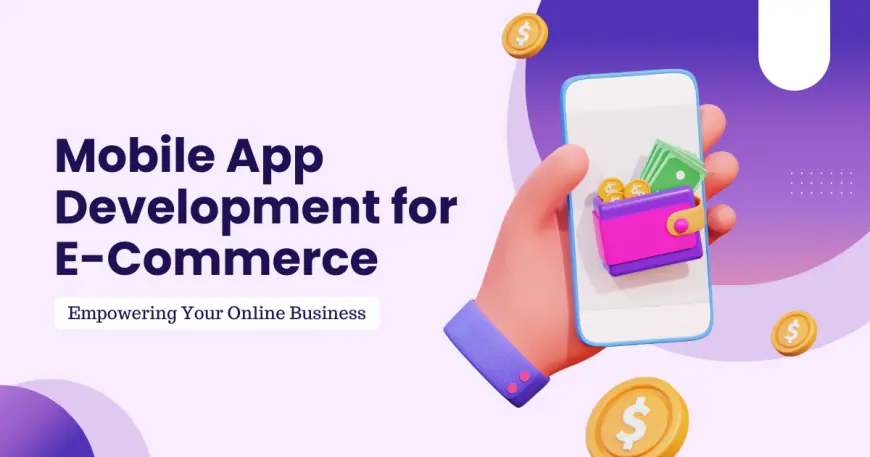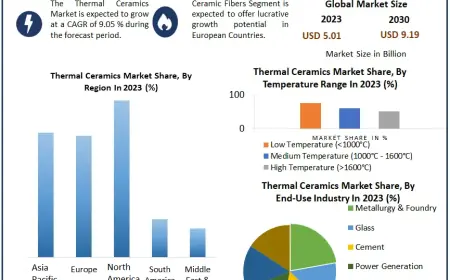Mobile App Development for E-Commerce: Empowering Your Online Business in the Digital Age
In this comprehensive guide, we’ll explore the importance of mobile apps for e-commerce, the key features that make an app successful, and how to overcome the challenges of app development, including when and why you should hire a backend developer.

In 2025, mobile e-commerce sales are projected to account for over 72% of total e-commerce sales worldwide, demonstrating the growing reliance on mobile platforms for shopping. As consumers increasingly use their smartphones to browse and purchase products, having a high-performing mobile app for your e-commerce business is not just a luxury but a necessity. A well-designed app can enhance user experience, boost sales, and foster customer loyalty.
Why Mobile Apps Are Crucial for E-Commerce
With more than half of all internet traffic now coming from mobile devices, mobile apps have become the cornerstone of modern e-commerce. Here are some key reasons why having a mobile app is crucial for your business:
Enhanced User Experience
Mobile apps offer a smoother and more personalized experience compared to traditional websites. They allow for faster loading times, simpler navigation, and more intuitive designs, resulting in a more enjoyable shopping experience for your customers. This directly translates to longer session times and improved customer satisfaction.
Higher Conversion Rates
Mobile apps typically outperform mobile websites in converting visitors into customers. App users are more likely to purchase because apps provide a streamlined, focused environment that reduces friction in the buying process. Furthermore, apps tend to offer faster checkout experiences and easy access to past orders and payment details.
Personalization
Thanks to advancements in artificial intelligence (AI) and machine learning (ML), mobile apps can offer highly personalized shopping experiences. From product recommendations based on browsing history to tailored offers and discounts, mobile apps engage users with content and deals that are most relevant to their preferences.
Offline Access
Another distinct advantage of mobile apps is their ability to provide limited functionality offline. Many apps allow users to browse products, save items to a wishlist, or even make purchases without an internet connection, providing added convenience.
Key Features of a Successful E-Commerce Mobile App
To stay competitive in the crowded e-commerce space, your mobile app needs to offer features that enhance both usability and functionality. Here are the essential features that every successful e-commerce mobile app should include:
User-Friendly Interface (UI)
The design of your app should be clean, intuitive, and easy to navigate. A user-friendly interface ensures that customers can find what they’re looking for quickly, minimizing frustration and enhancing their overall experience.
Secure Payment Gateway
In today’s digital world, consumers are cautious about online transactions. Offering multiple secure payment options—including credit/debit cards, digital wallets, and perhaps even cryptocurrency—will help build trust and reduce cart abandonment rates.
Product Recommendations
AI-driven product recommendations based on users’ behavior (such as past purchases, searches, or wishlist items) can significantly enhance the shopping experience. These features keep customers engaged and encourage more frequent purchases.
Push Notifications
Push notifications are a powerful tool for keeping users informed about sales, new arrivals, discounts, and more. They serve as a direct line of communication with customers, driving engagement and retention.
Advanced Search and Filters
Allowing users to easily search and filter products by category, price range, brand, and other criteria helps them find exactly what they’re looking for, improving user satisfaction and conversion rates.
Wishlist and Cart
Providing users with the ability to save items to a wishlist or shopping cart encourages them to return to the app, potentially increasing conversion rates. Features like "save for later" make it easier for customers to revisit products they are interested in.
Real-Time Order Tracking
Customers want to know exactly where their orders are in the fulfillment process. Offering real-time order tracking gives users peace of mind and improves the overall post-purchase experience.
Customer Support
In-app chat features or integrated customer support channels provide immediate assistance to users, resolving issues and inquiries in real-time. This is crucial for building trust and retaining customers.
Benefits of Developing a Mobile App for Your E-Commerce Business
Investing in a mobile app can provide numerous benefits for your e-commerce business, including:
Improved Brand Loyalty
Having an app on users' devices keeps your brand front and center. Customers are more likely to develop loyalty to your brand when they have quick and easy access to your products and services.
Increased Engagement
Push notifications, personalized content, and tailored offers keep customers engaged and encourage repeat purchases. The more engaged your customers are, the more likely they are to make a purchase.
Higher Revenue
Mobile apps provide a more convenient and accessible shopping experience, which leads to higher average order values and increased sales.
Valuable Insights
Apps offer powerful data collection capabilities that allow businesses to track user behavior, preferences, and interactions. This data can be analyzed to optimize your offerings and marketing strategies.
The Development Process: Step-by-Step Guide
Building an e-commerce mobile app is a complex process that involves careful planning and execution. Here’s a breakdown of the essential steps to ensure the success of your app:
Step 1: Define Your Goals
Before you begin development, it’s crucial to define the goals of your app. Are you focusing on improving customer engagement, streamlining the shopping experience, or driving higher conversion rates? Understanding your objectives will guide the entire development process.
Step 2: Choose the Right Platform
Depending on your target audience and budget, you will need to decide whether to create a native app for iOS or Android, or opt for a cross-platform solution. Native apps offer better performance, while cross-platform apps are more cost-effective. You can also consider Progressive Web Apps (PWAs) for an app-like experience in a browser.
Step 3: Design the User Interface
A visually appealing and easy-to-navigate design is key to retaining customers. The UI should align with your brand’s identity and create an enjoyable shopping experience.
Step 4: Develop the Backend
The backend is the backbone of any e-commerce app. It handles the product catalog, user accounts, transactions, and data storage. This is where a skilled backend developer plays a crucial role in ensuring that the app functions smoothly and securely.
Step 5: Integrate Essential Features
Incorporate features like secure payment gateways, push notifications, and analytics tools to enhance the app’s functionality and user experience.
Step 6: Test Rigorously
Testing is vital to identify any bugs or usability issues. Perform thorough testing to ensure that the app is functional, user-friendly, and secure across all devices and platforms.
Step 7: Launch and Promote
Once your app is tested and ready, launch it on app stores and promote it via social media, email campaigns, and other marketing strategies to drive downloads and initial sales.
Why You Should Hire a Backend Developer
While front-end development focuses on the user-facing elements of your app, the backend handles the logic and database functions that keep everything running smoothly behind the scenes. Hiring a skilled backend developer is crucial for ensuring that your e-commerce app:
-
Manages Transactions Securely: A backend developer ensures that payment processing, inventory management, and user data are handled securely and efficiently.
-
Scales as Your Business Grows: Your app’s backend needs to be scalable to handle increasing traffic and growing product catalogs. A backend developer can build systems that scale seamlessly.
-
Integrates with Third-Party Services: Many e-commerce apps need to integrate with external services for payment processing, shipping, and analytics. A backend developer ensures these integrations work smoothly.
-
Ensures High Performance: A well-optimized backend reduces latency and improves app performance, ensuring customers have a fast, smooth experience.
Leveraging AI and Machine Learning in E-Commerce Apps
AI and ML are transforming the e-commerce landscape by enabling personalized experiences and enhancing operational efficiency. Here are some ways to leverage these technologies in your app:
-
Personalized Product Recommendations: AI can analyze user data and recommend products based on their preferences and browsing behavior.
-
AI Chatbots: These intelligent bots can provide instant customer support, answer queries, and even assist with product recommendations.
-
Inventory Management: ML algorithms can predict demand trends, helping businesses optimize stock levels and reduce overstocking or stockouts.
Overcoming Challenges in Mobile App Development
Developing a successful mobile app isn’t without its challenges. Some common obstacles include:
-
Budget Constraints: High-quality mobile app development can be costly, but balancing functionality and design with your budget is key.
-
Compatibility Issues: Ensuring that your app works across multiple devices and operating systems requires thorough testing and attention to detail.
-
Security Risks: With the increase in cyber threats, implementing robust security measures to protect user data and transactions is crucial.
Future Trends in E-Commerce Mobile Apps
To stay competitive, it’s essential to keep an eye on emerging trends in mobile app development:
-
Voice Commerce: Voice search and voice-assisted shopping are becoming more popular, allowing for hands-free, frictionless shopping experiences.
-
Augmented Reality (AR): AR allows customers to visualize products in their homes or on their bodies before making a purchase.
-
Blockchain Payments: Blockchain technology can make transactions more secure and transparent, gaining consumer trust.
-
Sustainability Features: More consumers are becoming environmentally conscious. Highlighting eco-friendly practices or allowing users to choose sustainable products can boost your brand's appeal.
Conclusion
Developing a mobile app for your e-commerce business is a powerful way to engage customers, increase sales, and build brand loyalty. By offering essential features, leveraging AI, and staying ahead of industry trends, your app can become an indispensable tool in driving business success. If you’re planning to build an e-commerce app, make sure to hire a skilled backend developer to handle the technical complexities and ensure that your app performs efficiently, scales as your business grows, and provides a seamless user experience. Embrace the future of e-commerce today and
What's Your Reaction?
 Like
0
Like
0
 Dislike
0
Dislike
0
 Love
0
Love
0
 Funny
0
Funny
0
 Angry
0
Angry
0
 Sad
0
Sad
0
 Wow
0
Wow
0














































